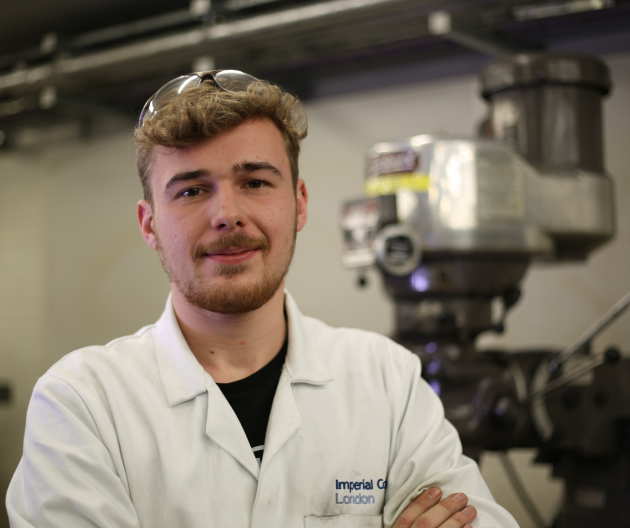 Luke completed the Technician Apprenticeship Scheme in 2020 and now works as a Mechanical Engineering Technician in our Department of Mechanical Engineering
Luke completed the Technician Apprenticeship Scheme in 2020 and now works as a Mechanical Engineering Technician in our Department of Mechanical Engineering
Why did you choose to do an apprenticeship?
I chose the apprenticeship route because, personally, I feel that this is the best way to qualify for a “hands-on” role such as this. Not only do you gain the necessary practical experience in a safe learning environment, but it is also backed up by the theoretical knowledge which you learn alongside. The mixture of practice and theory is very complimentary- you gain the practical background to apply the theoretical knowledge and visa-versa, which opens a much broader understanding of the subjects. With apprenticeships you also have the benefit of earning whilst you are learning.
Working for an organisation such as Imperial College London also has its own perks as you always have the opportunity to get involved in networking events, talks, days out, training sessions and many other interesting events which progress through the academic year. This gives you the chance to get yourself out there and make connections across the university and also with other organisations.
What qualifications did you gain on your apprenticeship programme?
As part of my apprenticeship, I completed:
- Level 2 and level 3 work-based National Vocational Qualifications
- Level 4 Higher National Certificate in Mechanical Engineering
- Level 5 Higher National Diploma in Mechanical Engineering
I also started an undergraduate degree in Mechanical Engineering.
What was the highlight?
For me, the highlight was working with various groups of students on different projects from start to finish, through designing initial solutions, making amendments and ending with a completed part or assembly. It is interesting to collaborate with a number of students or researchers from different fields of engineering and is satisfying to produce an end product to address a real-life problem which will be used in their day-to-day research.
What skills have you gained?
I have gained a range of work-based skills such as the use of manual milling and turning machines with a range of different techniques, along with the use of CNC milling and turning centres and the knowledge required for programming and setting parts. I have also learned CAD and CAM software packages to aid in the design and production of parts, rigs and countless other projects which I have worked on. However, apprenticeships are not only about gaining job skills and experience but are also about personal development and learning how to communicate and collaborate comfortably with various teams of new people in a working environment. They are also about learning how to carry yourself and make the most of situations which normally you wouldn’t be comfortable in.
What advice would you give to someone considering this route?
My advice to others who are considering a technical apprenticeship route is, firstly, to ensure that the programme you choose is right for the pathway you are interested in. For example, if it is Mechanical Engineering you are interested in, ensure that the programme touches on all of the aspects of mechanical engineering that you wish to experience. Then, look at the qualifications that the programme offers and ensure that these are the ones you need to get where you want to be after the apprenticeship. Also, it is important to be able to get involved in networking events to connect with people from other organisations and companies, as they could open up opportunities for you in the future.
Academic Technology Approval Scheme (ATAS)
With effect from 21 May 2021, any individual who will be undertaking research activities, at PhD level or above, in one of the Academic Subjects/Fields of Research relevant to ATAS will be required to obtain a free of charge ATAS certificate before they can apply for a visa to work in the UK. This will include research, academic, engineering and technician staff applying for Skilled Worker visas. Some exemptions apply.
Find out more about about the ATAS scheme